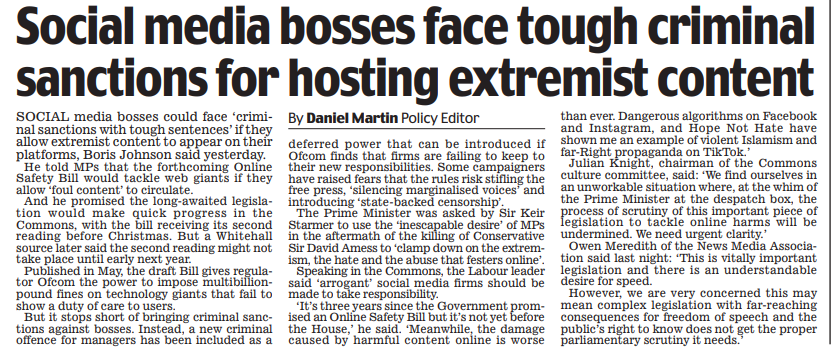NMA: Online Safety Bill Must Receive Proper Parliamentary Scrutiny
The Online Safety Bill must receive proper Parliamentary scrutiny to ensure that the legislation does not have adverse consequences for freedom of speech and the public right to know, the News Media Association has said.
Responding to Boris Johnson’s announcement yesterday that the Online Safety Bill will have a second reading before Christmas, NMA chief executive Owen Meredith said: “This is vitally important legislation and there is an understandable desire for speed.
“However, we are very concerned this may mean complex legislation with far-reaching consequences for freedom of speech and the public’s right to know does not get the proper Parliamentary scrutiny it needs.
“Not only does it leave the definition of what is legal but harmful to the Home Secretary of the day, without a comprehensive exemption for legitimate news publishers, but American owned tech giants will be put in a position to decide what news the British public can read in search and social media, and what they can’t.
“The Parliamentary Joint Committee currently considering the draft Bill should be allowed to conclude its detailed work and the Government to respond.”
The NMA believes that further scrutiny of the Bill is essential to ensure that provisions in the current drafting do not have a detrimental impact upon freedom of speech.
Earlier this afternoon, publishers told members of the Draft Online Safety Bill Joint Committee of some of their concerns with the Bill as it stands currently.
Gavin Millar QC, Society of Editors president Alison Gow, Matt Rogerson, Guardian Media Group director of public policy, also representing the NMA, and dmg media editor emeritus Peter Wright appeared as witnesses before the Committee.
Asked by committee chair Damian Collins MP if they had concerns about the impact of the Bill on freedom of expression, Mr Wright said that the journalistic protections within the Bill were insufficient to prevent the tech platforms from blocking and taking down journalistic content.
Under the regime, tech platforms would rely on algorithms and outsourced “fact checkers”, some of whom may be single issue lobby groups, to comply with the new duty of care, leading to legitimate journalism being blocked, he added.
“I’m hugely sceptical about this and, in my view, the exemption needs to be made a positive exemption so that the duty of care obliges platforms not to moderate journalistic content when it’s produced by recognised news publishers, for which there is a good definition in the Bill,” he added.
Ms Gow said the Bill had wide ranging implications for regional and local news. “The time and effort it takes even now to resolve issues that arise from takedowns shouldn’t be underestimated,” she said. “More layers are going to stifle how we surface content to readers even further.”
Mr Rogerson agreed that a positive exemption for publishers was “essential” and that fact checkers employed by platforms could not be relied upon to moderate news. “If you’ve got that blunt labelling by people who don’t understand journalism that’s extremely problematic.”
It means that it’s more important than ever that the DCMS committee will be monitoring the passage of the bill and actively highlighting errors and suggesting improvements as it goes through the house.
— Julian Knight MP (@julianknight15) October 20, 2021
Pre-legislative scrutiny is about getting all ducks in a row and ensuring a wide base of parliamentary support, I’m afraid this mishandling of the process means that the online harms bill is set to be a real bone of contention in both houses.
— Julian Knight MP (@julianknight15) October 20, 2021
